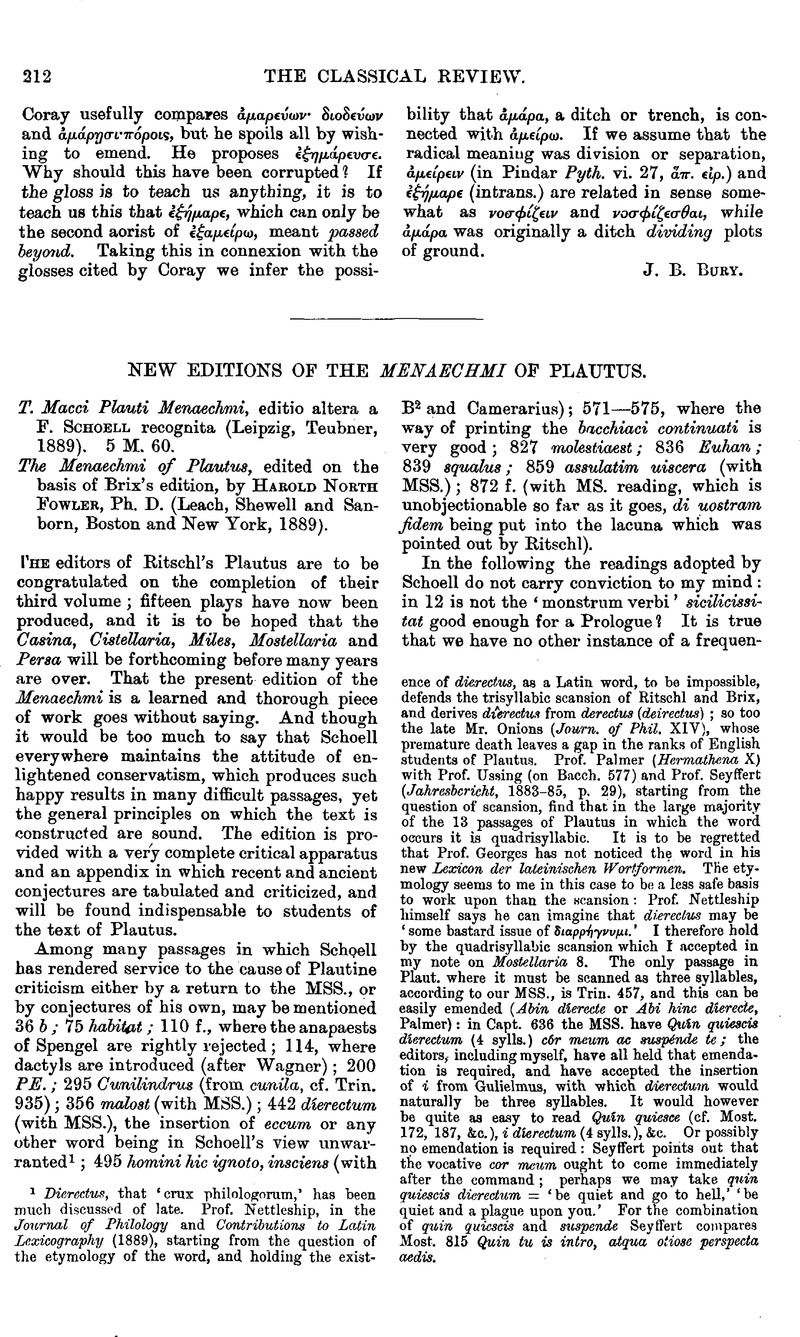No CrossRef data available.
Article contents
New Editions of the Menaechmi of Plautus - T. Macci Plauti Menaechmi, editio altera a F. Schoell recognita (Leipzig, Teubner, 1889). 5 M. 60. - The Menaechmi of Plautus, edited on the basis of Brix's edition, by Harold North Fowler, Ph. D. (Leach, Shewell and Sanborn, Boston and New York, 1889).
Published online by Cambridge University Press: 27 October 2009
Abstract

- Type
- Book Review
- Information
- Copyright
- Copyright © The Classical Association 1890
References
page 212 note 1 Dierectus, that ‘crux philologorum,’ has been much discussed of late. Prof. Nettleship, in the Journal of Philology and Contributions to Latin Lexicography (1889), starting from the question of the etymology of the word, and holding the existence of dierectus, as a Latin word, to be impossible, defends the trisyllabic scansion of Ritschl and Brix, and derives díerectus from derectus (deirectus); so too the late Mr. Onions (Journ. of Phil. XIV), whose premature death leaves a gap in the ranks of English students of Plautus. Prof. Palmer (Hermathena X) with Prof. Ussing (on Bacch. 577) and Prof. Seyffert (Jahresbericht, 1883–85, p. 29), starting from the question of scansion, find that in the large majority of the 13 passages of Plautus in which the word occurs it is quadrisyllable. It is to be regretted that Prof. Georges has not noticed the word in his new Lexicon der lateinischen Wortformen. The etymology seems to me in this case to be a less safe basis to work upon than the scansion: Prof. Nettleship himself says he can imagine that diereclus may be ‘some bastard issue of διαρρήγνυμι.’ I therefore hold by the quadrisyllabic scansion which I accepted in my note on Mostellaria 8. The only passage in Plaut. where it must be scanned as three syllables, according to our MSS., is Trin. 457, and this can be easily emended (Abin díerecte or Abi hinc díerecte, Palmer): in Capt. 636 the MSS. have Quín quiescis díerectum (4 sylls.) cór meum ac suspénde te; the editors, including myself, have all held that emendation is required, and have accepted the insertion of i from Gulielmus, with which dierectum would naturally be three syllables. It would however be quite as easy to read Quín quiesce (cf. Most. 172, 187, &c.), i díerectum (4 sylls.), &c. Or possibly no emendation is required: Seyffert points out that the vocative cor meum ought to come immediately after the command; perhaps we may take quin quiescis dierectum = ‘be quiet and go to hell,’ ‘be quiet and a plague upon you.’ For the combination of quin quiescis and suspende Seyffert compares Most. 815 Quin tu is intro, atqua otiose perspecta aedis.
page 213 note 1 Here Schoell's apparatus corrects that of Ritschl, Ussing, Wagner and Vahlen.
page 213 note 2 The two iambic words at the end of a senarius are allowed in this and similar phrases.
page 213 note 3 No doubt Priscian may be here quoting the Ambrosian ‘recension,’ as he often does; but in the absence of the direct testimony of A in this place, we cannot be sure; and in any case it does not follow that the Ambrosian recension should be preferred to the Palatine.
page 214 note 1 Spelling was made for man, not man for spelling. Ni may possibly be the right form of the prohibitive particle in Plaut, for it was not till the beginning of the eighth century A.v.c. that ni was limited to conditional functions, leaving ne in possession of the field of prohibition, which it had occupied during the sixth century. But if so, ne should be abolished altogether in our texts; the reader would then be prepared for the ambiguity of ni. In Rudens 810 Schoell spells the conditional particle nei (after Pareus).


